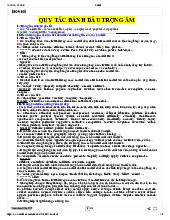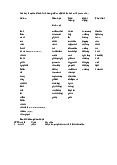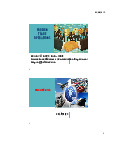





Preview text:
I. PRESENT TENSE: 1. Present simple: A. Cấu trúc (Form): Verb: + S + V (s/es) +… -
S+ do/does+ not (don’t/doesn’t) + V… ? Do/Does + S + V… ?
* Thêm es vào các động từ tận cùng là o, s, sh, ch, x, z. To be: + S + am/is/are….. -
S + am not/ is not (isn’t)/ are not (aren’t)… ? Am/ Is/ Are + S + V…..? B. Cách dùng (Usage): -
Habits or things that we do regularly ( thói quen, hành động xảy ra thường xuyên, lặp đi lặp lại ở hiện tại) Ex: Tom to dance lessons every Sunday goes .
I usually listen to the radio at night. -
Permanent situations ( tình huống cố định, lâu dài: nghề nghiệp…) Ex: I work in London. -
Sở thích, nguồn gốc, xuất xứ, bình phẩm
Ex: Most teenagers like films. I come from HCM city.
She is not only beautiful but also intelligent. -
General truths (sự thật, chân lý hiển nhiên) Ex: The moon round the earth. goes -
Timetable or a fixed plan (sự kiện dự kiến trong tương lai: Thời khóa biểu, chương trình, kế hoạch theo thời gian cố định).
Ex: His train arrives at 7:30.
I start my new job tomorrow.
C. Dấu hiệu nhận biết (Helpful hints): -
Often uses with the following words or phrases:
Adverbs: always, usually, often, sometimes, rarely, never Phrases: o Every Monday/week/…. o Each Monday/weak/…. o Once/twice a week/month.. o Three times a week/month…. -
These adverbs usually go before the verb, but after the verb be:
I often play football with my friends.
I am often late for my piano lessons. 2. Present continuous: A. Cấu trúc (Form): + S + am/is/are + Ving - S+ am/is/are + not + Ving… ? Am /Is/Are + S + Ving… ? B. Cách dùng (Usage): -
Actions happening now (Sự việc đang diễn ra ngay lúc nói, hoặc đang diễn ra ở hiện tại nhưng không
nhất thiết vào lúc đang nói)
Ex: My sister is watching TV now. Are pr
you eparing for the exam? -
Temporary situations (tình huống tạm thời)
Ex: She is working at the museum until the end of the month. -
Annoying habits (usually with “always”) ( thói quen gây khó chịu, thường đi với “always”)
Ex: She is always complaining about her work.
My brother is always borrowing my CDs without asking! -
Sự việc xảy ra trong tưong lai gần - một sự sáp xếp hoặc một kế hoạch đã định. Cách dùng này luôn
được dùng với trạng từ chỉ thời gian tương lai (để tránh nhầm lẫn với hành động đang xảy ra).
Ex: We are coming to see our grandfather tomorrow. Note: -
Stative verbs do not usually describe actions. They describe states ( feelings, thoughts,…). They are not
normally used in continuous tenses (Không dùng thì hiện tại tiếp diễn với các động từ trạng thái).
I like reading books in my free time.
I am liking reading books in my free time. -
Some common stative verbs: appear, be, believe, belong to, hate, hate, have, include, know, like, love,
need, prefer, see, seem, taste, think, understand, want,…. -
Some of these verbs ( such as be, have and
) are used in continuous tenses when they think describe actions:
What do you think about his new song?
I’m thinking about last night’s match.
C. Dấu hiệu nhận biết (Helpful hints): -
Often used with the following words and phrases: now, right now, at the moment, at present, today, this week, look, hear,.. 3. Present perfect: A. Cấu trúc (Form): + S + have/has + V3/ed ….. - S + have/has + not + V3/ed … ? Have/has + S + V3/ed …? B. Cách dùng (Usage): -
Situations that started in the past and are still true (Sự việc xảy ra trong quá khứ còn kéo dài hoặc có ảnh
hưởng đến hiện tại hay tương lai).
Ex: John has worked here for three years.
He has broken his leg, so he can’t play tennis. -
Completed actions at the time in the past which is not mentioned ( Sự việc đã xảy ra trong quá khứ khi
người nói không biết rõ hoặc không muốn đề cập đến thời gian chính xác)
Ex: I have visited Hanoi.
I’ve already read that book. -
Completed actions where the important thing is the result now ( hành động xảy ra trong quá khứ nhưng
lại để dấu hiệu hoặc hậu quả ở hiện tại).
Ex: They’ve all done their homework. -
Diễn tả hành động lặp đi lặp lại nhiều lần trong quá khứ.
Ex: I have read that book three times.
C. Dấu hiệu nhận biết (Helpful hints):
Often used with the following words and phrases: just, recently, lately (vừa already mới, gần đây), (rồi),
never (không bao giờ, chưa bao giờ), ever (đã từng), before (trước đây), for + khoảng thời gian (trong),
since + mốc thời gian (từ), so far, until now, up to now, up to present (cho đến nay)…. Note: -
We don’t use the present perfect simple when we want to say when sth happened in the past. We use the
past simple ( không sử dụng HTHT khi nói về những thứ đã xảy ra trong quá khứ, sử dụng QKĐ)
I did my homework last night. -
We don’t use the past simple when we want to show that sth happened before now or still important
now. We use the present perfect simple. ( không sử dụng QKĐ đẻ nói về những thứ xảy ra trước đây
hoặc vẫn còn quan trọng đến thời điểm hiện tại)
I’ve finished! Can I go home now?
4. Present perfect continuous: A. Cấu trúc (Form): +
S + have/has + been + Ving ….. -
S + have/has + not + been + Ving … ? Have/has + S + been + Ving…? B. Cách dùng (Usage): -
Sự việc xảy ra trong quá khứ kéo dài liên tục đến hiện tại hoặc tương lai, nhấn mạnh tính liên tục, kéo dài của sự việc.
Ex: He has been working for ten hours without rest. -
Sự việc vừa mới chấm dứt và có kết quả ở hiện tại.
Ex: I must go and wash. I’ve been gardening.
C. Dấu hiệu nhận biết (Helpful hints): -
Often used with the following words and phrases: all day/week/….,almost every day this week…, in the
past year, for, since, just,… Note: -
HTHT: result of the action.
She’s written an article for the school newspaper. ( = She’s finished it.) -
HTHTTD: the time spent on the action, rather than the result.
She’s been written an article for the school newspaper. ( = She’s started, but she hasn’t finished). 5. Past simple: A. Cấu trúc (Form): Verb: + S + V 2/ed + … - S+ did+ not (didn’t) + V… ? Did + S + V… ? To be: + S + was/were….. -
S + was/were + not (wasn’t/weren’t).. ? Was/Were + S + V…..? B. Cách dùng (Usage): -
Completed actions and events in the past ( Sự việc đã xảy ra và chấm dứt trong quá khứ, biết rõ thời gian).
Ex: He worked here three years ago. -
Repeated actions in the past ( thói quen, hành động lặp đi lặp lại trong quá khứ).
Ex: I often went for a walk when I lived in the countryside.
I went to the theatre four times last month. -
A sequence of actions or events (Một chuỗi sự việc nối tiếp nhau trong quá khứ)
Ex: Yesterday morning, John got up at 7 o’clock, breakfast, and had went to work.
C. Dấu hiệu nhận biết (Helpful hints): -
Often used with the following words and phrases: yesterday, last week/summer/…., in + năm trong qk,
an hour/a week/a year…ago,….. 6. Past simple continuous: A. Cấu trúc (Form): + S + was/were + Ving - S+ was/were + not + Ving… ? Was/Were + S + Ving… ? B. Cách dùng (Usage): -
Actions happening at a moment in the past (Sự việc đang diễn ra tại một thời điểm cụ thể trong quá khứ)
Ex: What were you doing at 7 o’clock last night? ~ I was watching TV. -
Two actions in progress at the same time ( Hai hành động xảy ra đồng thời tại một thời điểm xác định trong quá khứ)
Ex: Yesterday, he was reading a newspaper while his wife was cooking in the kitchen. -
Sự việc đang diễn ra trong quá khứ thì có một sự việc khác xảy đến (dùng cho hành past continuous
động kéo dài, dùng past simple cho hành động xảy đến).
Ex: When I came yesterday, they were having dinner. -
Sự việc xảy ra thường xuyên trong quá khứ gây bực mình, phiền toái.
Ex: She was always boasting about her work when she worked here.
C. Dấu hiệu nhận biết (Helpful hints): -
Often used with the following words and phrases: o At the moment o While o
Giờ + trạng từ qk ( at 3pm yesterday)
o At this/that time + trạng từ qk ( at this time last week) Note: -
Do not use QKTD for regular or repeated actions in the past:
Last year, I was going to the cinema every weekend.



